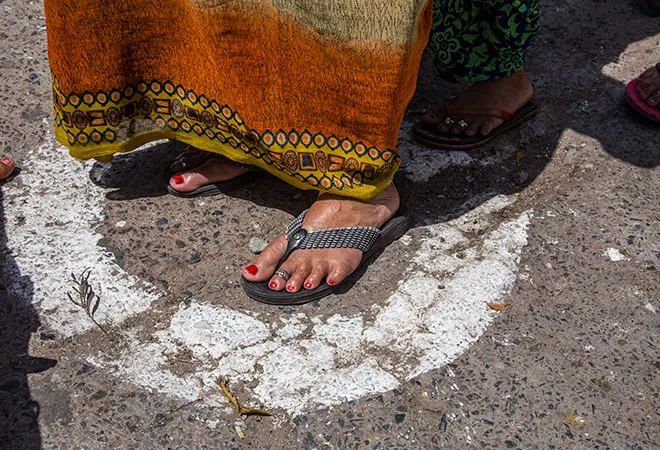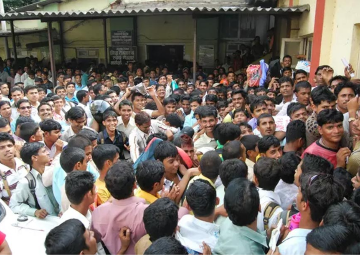
The nationwide lockdown announced by Prime Minister Narendra Modi on 24 March 2020 was intended as one of the first steps to arrest the spread of the deadly coronavirus sweeping the world with great ferocity. It on the other hand ended up sending a chill of uncertainty and fear amongst millions of migrant worker population spread across the India. In the ensuing panic, migrant workers, majority of whom were daily wage earners, took to the highways to get back to their villages on foot several hundred KMs away. While some of them died in road accidents, a few died due to fatigue brought on by the perilous journey under the scorching sun. This incident was a national shame unfolding across media channels of the world. The lockdown announced, gave all but four hours to people to scurry home or stay put where ever they were at that point in time. While it was necessary for the lockdown to serve as a clarion call to the war against the deadly pandemic, in hind sight, the lockdown lacked coordination between Centre and State which should have ensured that clear instructions were sent to law enforcement and agencies in charge of handling migrant workers present in different States.
Interstate migration makes up for a key source of income for the low-income household in India, and despite the growing migration trend of nearly 4.5% annually between States, migrants continue to face barriers in their destination States.
According to the latest and most reliable figures, India has over 400 million migrants (Indian Census, 2011). It can be safely assumed a large proportion of them are internal migrants — this includes interstate migrants, intrastate migrants and intradistrict migrants. Delhi, Gujarat, Haryana, Kerala, Maharashtra, Punjab and Tamil Nadu have been the major destination states for migrants in India as per the Census of India website. Interstate migration makes up for a key source of income for the low-income household in India, and despite the growing migration trend of nearly 4.5% annually between States, migrants continue to face barriers in their destination States.
Although the State governments tried to their get their act together in their typical ad hoc manner with arrangements for food and shelter, it did little to assuage the fears of the migrant. A second wave of migrant took to the streets in Mumbai when the announcement was made to extend the lockdown beyond 14 April by the Prime Minister, but this time it is quite possible that the unrest could have been politically motivated and the migrant worker ending as meagre pawns in the hands of the power brokers.
If one looks at the recent plight of the migrant worker it is starkly evident that such provisions have proved to be inadequate to address the migrant labourers social and economic marginalisation.
What emerges from this sad episode, puts into question the very efficacy of the Interstate Migrant Workmen (Regulation of Employment and Conditions of Service) Act, 1979 (ISMW) and the role of the Chief Labour Commissioner (CLC) in its enforcing. The Act failed to live up to its intended purposes. Was the CLC’s office consulted when the lockdown was planned, and did the CLC provide adequate data required in planning for the lockdown? The exodus of migrant workers in the millions from urban areas such as National Capital Region could have been better managed, had the ‘The Interstate Migrant Workmen (Regulation of Employment and Conditions of Service) Act 1979,’ been implemented in its entirety. Along with the ISMW Act there are also other provisions such as the the Minimum Wages Act, 1948; the Contract Labour (Regulation and Abolition) Act, 1970; the Equal Remuneration Act, 1976; and the Building and Other Construction Workers (Regulation of Employment and Conditions of Service) Act, 1996. If one looks at the recent plight of the migrant worker it is starkly evident that such provisions have proved to be inadequate to address the migrant labourers social and economic marginalisation.
ISMW Act 1979, is an act of the Parliament of India enacted to regulate the condition of service of interstate labourer in Indian labour law. The Act’s purpose is to protect workers whose services are requisitioned outside their native states in India. Whenever an employer faces shortage of skills among the locally available workers, the act creates provision to employ better skilled workers available outside the state.
Firstly, one needs to understand the applicability of the Act. It is applicable to, every establishment in which five or more interstate migrant workmen (whether or not in addition to other workmen) are employed or who were employed on any day of the preceding twelve months. Every contractor who employs or who employed five or more inter-state migrant workmen (whether or not in addition to other workmen) on any day of the preceding twelve months.
In case of the above, some of the important duties of the employer are:
- Make an application to the registering officer, in such form and manner and on payment of such fees as may be prescribed, for the registration of the establishment.
- Maintain the registers indicating the details of interstate workers and make available for scrutiny by the statutory authorities.
- Principal employer shall be liable to bear the wages and other benefits to interstate workers in case of failure by the contractor to affect the same. Liable for the prescribed punishments for violations committed under this Act.
- In case of any employment injury or fatal accident, ensure the same is informed to authorities of States concerned and to the kins of the deceased through the contractor.
Employment of inter-State migrant workmen in any establishment is prohibited unless it is duly registered under this Act. Enforcement and strict adherence to the above is crucial in the generation of data which leads to the formulation of implementable policies, regulations as well SOP’s for crisis management in the ongoing pandemic.
Where did the States go wrong? Is it not the responsibility of the Central and State government to protect the rights of the migrant workers as enshrined in ISMW Act? If all the States had implemented the ISMW Act 1979 faithfully, they would have had full data on immigrant workers in regard to their home State and other particulars. In the digital age the CLC of India would also have had access to this data State wise or he already does. Where was the failure in this regard is matter of enquiry because had this information been made available the mass migration that followed the lockdown if not avoided at least could have been better managed?
If all the States had implemented the ISMW Act 1979 faithfully, they would have had full data on immigrant workers in regard to their home State and other particulars.
Nearly all States with significant migrant labour population such as Maharashtra, Delhi, Kerala, Tamil Nadu, Karnataka, Telangana have their own amendments to the ISMW Act 1979. In a statistical analysis presented by India Migration Now, while Kerala ranked first for migrant friendly policies, Maharashtra ranked second with a score of 42 out of 100 compared to Kerala’s 62, and Punjab came in third with a score of 40. Apart from Kerala and Maharashtra that have taken some measures for migrant labour welfare, it is clear there is an absence of a cohesive migrant labour policy framework.
The report on the ‘Social Inclusion of Internal Migrants in India’ by UNESCO and UNICEF (2013) stipulates that “it is clear that there is an urgent need to develop a governance system for internal migration in India, i.e. a dedicated system of institutions, legal frameworks, mechanisms and practices aimed at supporting internal migration and protecting migrants.” Further, social protection architecture should be developed that allows for portability of services like PDS, health insurance, education in order to ensure easy and equal access to migrants. Migrant workers have to be integrated into the larger state level policies. India’s social and political rights should wean away from the assumption that people are sedentary and migration as a phenomenon be accepted so that evolving policy framework will fully include migrant labour issues during their formulation.
Other States can take lessons from Kerala that has introduced pioneering schemes such as Kerala Migrant Workers Welfare Scheme of 2010 that offers financial support for treatment of migrants for ailments, grant for their children’s education in Kerala and retirement benefits to those who complete five years under the scheme. Kerala also introduced another health insurance scheme called ‘Awaaz’ which was rolled out in 2017 with a dual objective to provide health insurance coverage to migrants, and prepare a comprehensive database of migrant labourers in the state.
There should equal access to opportunities for resident home and out of state residents.
If at all the States were to develop a migration policy framework which is surely the need of the hour then they should look above and beyond the framework prescribed at central government level. There should equal access to opportunities for resident home and out of state residents. In policy areas, where migrants face discrimination on account of their unique circumstances, special policy initiatives should be framed in order to have equality with state residents.
Availability of cheap and largely informal labour must not become USP of an economy in the long run. It was this informal labour force that toiled to build the infrastructure that powers the Indian economy. For years they have given India everything they could, working for minimum wages in appalling conditions keeping costs low to make domestic industries competitive and investment friendly for generations. They provide cheap and flexible services to rich and affluent in cities for the upkeep of their lifestyle. In the absence of a migrant labour workforce, the Indian economy would come to a standstill. It is time that the migrant worker be treated with respect and dignity they deserve and laws passed for their welfare levels be implemented letter and spirit.
The views expressed above belong to the author(s). ORF research and analyses now available on Telegram! Click here to access our curated content — blogs, longforms and interviews.




 PREV
PREV


